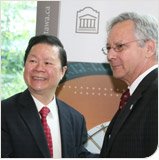 The Student Federation University of Ottawa (SFUO) has just released a public letter addressed to U of O President Allan Rock. The letter is entitled “Flagrant Mistreatment of Students and Disregard of SFUO Nomination Rights”.
The Student Federation University of Ottawa (SFUO) has just released a public letter addressed to U of O President Allan Rock. The letter is entitled “Flagrant Mistreatment of Students and Disregard of SFUO Nomination Rights”..
The letter demands that Rock redress two recent and most blatant abuses of power practiced by the university against its students. The letter describes the cases of international student Ting Ting Wang and physics student Marc Kelly.
.
.
 The SFUO also demands that the U of O administration accept the SFUO’s nomination of Mark Kelly to the Senate Appeals Committee.
The SFUO also demands that the U of O administration accept the SFUO’s nomination of Mark Kelly to the Senate Appeals Committee..
The Senate Appeals Committee is the committee whose members refused to identify themselves to grieving students, until the SFUO pressured the University administration by public exposure.
.
.
The SFUO letter makes public that VP-Academic Robert Major illegitimately interfered with Kelly’s nomination to the Senate Appeal’s Committee. The letter states that Major practiced a defamatory character assessment of Kelly, which Major is alleged to have communicated to an SFUO representative in an effort to discredit Kelly’s nomination.
.
.
VP-Academic Major is alleged to have advanced that student Kelly is mentally unstable, in supporting the VP’s rejection of Kelly’s nomination to the Senate Appeals Committee. This is the same VP-Academic Major whose views on gender equity and representative democracy are well known.
.
.
On a sane campus, in a sane world, and on any other campus in North America I would advance, the Board of Governors (BOG) would (would have already) promptly extract(ed) Robert Major’s resignation.
.
.
Is Canada’s university sane? Will it be fixed? The answer is in the hands of the BOG, while the President appears to be watching from the sidelines of international development.
.
.
President Allan Rock was repeatedly questioned by students and professors about the Kelly nomination at his October 24, 2008, address in the Agora, but he did not budge from his position that “we are entitled to have concerns”.
.
.
In addressing the students, Rock appeared to be oblivious to the asymmetry in the fact that students are not entitled to have concerns regarding the nominations of professors and executives to the Senate Appeals Committee.
.
.
[Photo credits: University of Ottawa; Allan Rock, Robert Major.]










